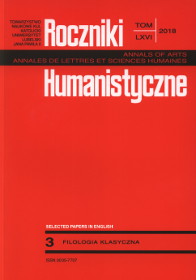The Myth of Prometheus in Plato’s Protagoras
Abstract
The Polish version of the article was published in “Roczniki Humanistyczne,” vol. 58–59 (2010–2011), issue 3
Protagoras is an exceptional dialogue of Plato as it uses two modes of expression: mythos and logos. Both are used by Protagoras in Great Speech, but the first one seems to be the most important. Protagoras chose the mythical mode of expression when he described to Socrates how he makes his pupils good citizens and politicians. The famous sophist told the story about two brothers: Prometheus and Epimetheus. It is easy to notice that Protagoras identifies with the clever Prometheus. However, the attentive reader can notice that Prometheus from Protagoras’ myth made a decision with fatal consequences. He entrusts his brother Epimetheus with a too responsible task. If Prometheus had been clever he should have predicted the dramatic consequences of his decision (see the etymology of his name). It might have been a conscious and intentional effort of Plato who wanted to ridicule Protagoras, the main opponent of Socrates. The resulting effect is so strong because Protagoras, who identifies with Prometheus, told the myth by himself in which Prometheus is in fact the less clever of the two brothers.
References
Diels, Hermann. Die Fragmente der Vorsokratiker. Hrsg. von Walther Kranz, vol. 1. Berlin: Weidmann, 1956.
Martin, Thomas R. Starożytna Grecja od czasów prehistorycznych do okresu hellenistycznego. Translated by Tomasz Derda. Warszawa: Prószyński i S-ka, 1998.
Morgan, Kathryn. Myth and philosophy from the Presocratics to Plato. Cambrige: Cambridge University Press, [2000].
Hartman, Jan, ed. Słownik filozofii. Kraków: Krakowskie Wydawnictwo Naukowe, 2006.
Słownik mitologiczny. Układu X. Alojzego Osińskiego, profesora literatury w gimnazjum wołyńskim. W Warszawie vol. I, 1806 and vol. II, 1808 (reprint).
Copyright (c) 2018 Roczniki Humanistyczne

This work is licensed under a Creative Commons Attribution-NonCommercial-NoDerivatives 4.0 International License.





